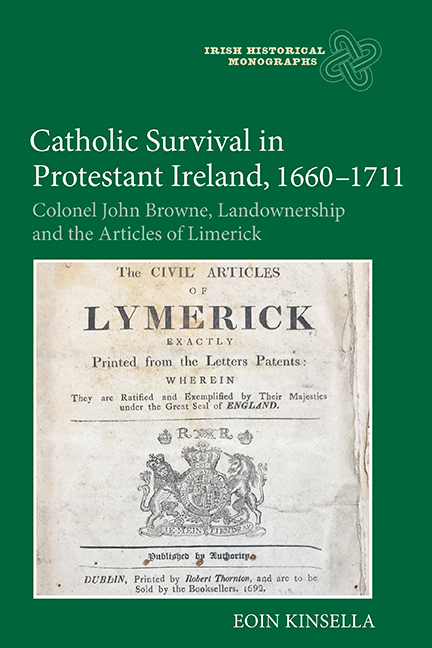 Catholic Survival in Protestant Ireland, 1660–1711
Catholic Survival in Protestant Ireland, 1660–1711 Published online by Cambridge University Press: 28 June 2018
This book is a study of Irish Catholic landownership and political lobbying, from the Restoration of Charles II in 1660 to the reign of Queen Anne. The fortunes of Irish Catholics fluctuated dramatically during this period, from the generally benevolent tolerance of Charles II's reign, through the heady days of the Catholic resurgence under James II, on to the beginnings of the penal era after 1691. Divided into three parts, the primary focus is on the rise of the ‘new interest’ of propertied Catholics after the Restoration, the Jacobite administration during the Williamite war (1689–91), the negotiation of the various articles of surrender that ended the war, and on the protracted and contested progress towards the implementation of these articles in the two decades that followed.
Part I provides an overview of the life and career of Colonel John Browne, an Irish Catholic who built one of the largest estates in Ireland in the 1660s and 1670s, as well as the impact of James II's reign on Catholic landowners. Lobbying by Irish Catholics, in Dublin and in London, provides the core focus for Parts II and III. Part II explores the drafting and aftermath of the various articles of surrender, signed during the Williamite war at Drogheda, Waterford, Galway, Inis Boffin, Sligo and Limerick. Those who claimed the benefit of the articles were known as the articlemen. Their political activity during the 1690s and early 1700s concentrated on ensuring that the Irish and English governments honoured the terms of the articles. Part III analyses the implementation and impact of article 13 of Limerick, an extraordinary and disputed addition to the terms that called for a special levy on all Catholicowned estates to help pay debts owed by John Browne. Article 13 was unique in a number of respects, and it proved to be the only article for which the Irish parliament actively sought to enact legislation. Though the aim of the Jacobite negotiators at Limerick was to safeguard the economic future of Irish Catholics, article 13 was financially punitive to the articlemen and they made strenuous efforts to prevent the collection of the special levy.
To save this book to your Kindle, first ensure [email protected] is added to your Approved Personal Document E-mail List under your Personal Document Settings on the Manage Your Content and Devices page of your Amazon account. Then enter the ‘name’ part of your Kindle email address below. Find out more about saving to your Kindle.
Note you can select to save to either the @free.kindle.com or @kindle.com variations. ‘@free.kindle.com’ emails are free but can only be saved to your device when it is connected to wi-fi. ‘@kindle.com’ emails can be delivered even when you are not connected to wi-fi, but note that service fees apply.
Find out more about the Kindle Personal Document Service.
To save content items to your account, please confirm that you agree to abide by our usage policies. If this is the first time you use this feature, you will be asked to authorise Cambridge Core to connect with your account. Find out more about saving content to Dropbox.
To save content items to your account, please confirm that you agree to abide by our usage policies. If this is the first time you use this feature, you will be asked to authorise Cambridge Core to connect with your account. Find out more about saving content to Google Drive.